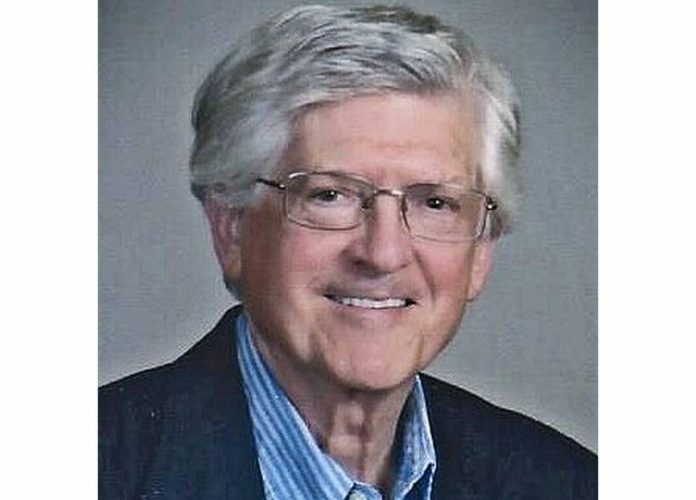Former President Donald Trump recently stated that he would not support NATO countries unless they met his version of non-binding spending guidelines on defense; until then, “I would encourage (Russia) to do whatever the hell they want.” It ranks as perhaps the most shocking American statement in the history of Cold War public discourse.
During the 1930s, before Adolf Hitler declared war on Russia, much weaker remarks than that were damned as appeasing dictators. It’s understandable if adult memories of World War II have dimmed. However, it is unforgivable for world leaders not to study the years when dictators ran amok and plunged the world into a catastrophe in which 60 million died, entire economic structures were destroyed and Europe lay in ruins.
One of the lessons learned was that a dictator like Hitler would not stop; he could only be stopped.
Trump has provided no evidence of knowing the foregoing or knowing that American relations with the Soviet Union, reaching back to the 1917 Revolution in Russia, had never been good. A decade and a half would pass before the U.S. even granted the USSR diplomatic recognition. For four years during World War II, it was only shared opposition to Germany, Italy and Japan that held the United States, Great Britain and the Soviet Union together as partners.
In the war’s aftermath, the Red Army first occupied and then began installing puppet governments throughout Eastern Europe – in Poland, Hungary, Romania, Bulgaria and Czechoslovakia, all in flagrant violation of an agreement reached at Yalta in 1945. By mid-century, the U.S. responded with several epoch-making decisions: the Truman Doctrine, Marshall Plan, Berlin Airlift, and NATO — the Euro-Atlantic security pact to protect against further Soviet aggression.
It should be acknowledged that the U.S. contributed to over-militarizing the Cold War rivalry and that the Soviet Union had legitimate grievances, among them the appalling fact that nearly half of all deaths during World War II were borne by that communist nation. Nevertheless, the postwar world that emerged was threatening in the extreme and made still worse by the existence of nuclear weapons. The NATO bulwark of Western protection is what Trump has threatened to break up.
When the ascent of Mikhail Gorbachev as General Secretary in 1985 brought promises of serious reforms, the Soviet Union soon collapsed and was dissolved in 1991. The long Cold War was over. Early in this century, however, it appeared to restart when President Vladimir Putin, skipping past Gorbachev and his successor Boris Yeltsin, reached back and picked up where his authoritarian predecessors Brezhnev, Andropov and Chernenko left off. His hopes of restoring Russia’s past glory and eventually regaining land “lost” to NATO brought about what now may be called the Second Cold War.
Putin is a smallish figure. Living a lifestyle that is beyond exorbitantly luxurious, what dark recesses of calculation, love of power and cruelty lie behind his deadpan expression? Literally thousands have died at his command, including many journalists and dissidents. Prominent among them are Boris Nemtsov (vocal opponent of Russian aggression against Ukraine, shot dead near the Kremlin); Natalya Estemirova (human rights activist shot in her head); Aleksandr Litvinenko (a Russian security agent poisoned with radioactive polonium-210 after fleeing to London); and Anna Politkovskaya (shot execution-style for protesting human rights abuses in Chechnya). These four are named merely to document how easily it is to pin down terror in Putin’s Russia. Their orchestrated deaths are a sign of what authoritarians can do whenever it suits them.
Alexei Navalny is Putin’s latest victim of poisoning. He had been courageous in saying to the Russian people that they are ruled by crooks and thieves. He met death in a remote penal colony above the Arctic Circle. When at last acknowledging Navalny’s death, Trump immediately pivoted to himself, saying he too is a victim of political persecution: “It’s a form of Navalny.” Any similarity between the two men is worse than an embarrassment. It’s grotesque. Navalny died for challenging a murderous regime. Meanwhile Trump lives luxuriously, flies around the country in his private plane and is free to campaign again for the presidency.
In Ukraine, Putin’s Russia is attempting to conquer a sovereign nation – an aggression two years ago that Trump called “brilliant”; Putin was “savvy” and a “genius,” he added. Should his aggression against Ukraine succeed, the Baltic states of Latvia, Estonia and Lithuania would likely be next – and bring in NATO, a consequence that would be far more expensive to us than sending arms to Ukraine now.
Now is an apt time to listen to the voices of history and reason. Western security is at stake, and history is watching how we respond.
Ron Lora, a native of Bluffton, is professor emeritus of history at the University of Toledo. Contact him at [email protected]. His column does not necessarily reflect the opinion of The Lima News editorial board or AIM Media, owner of the newspaper.







